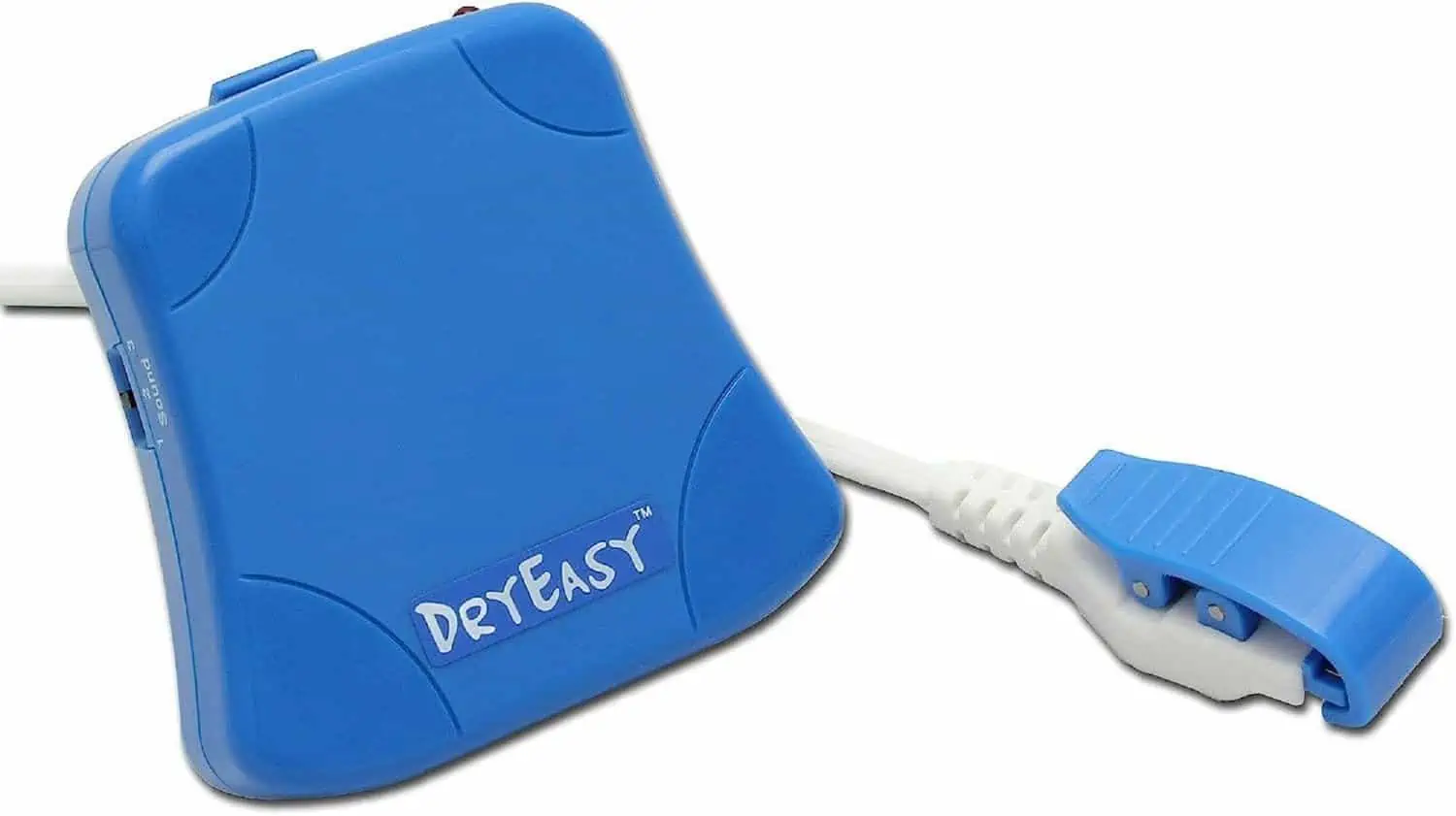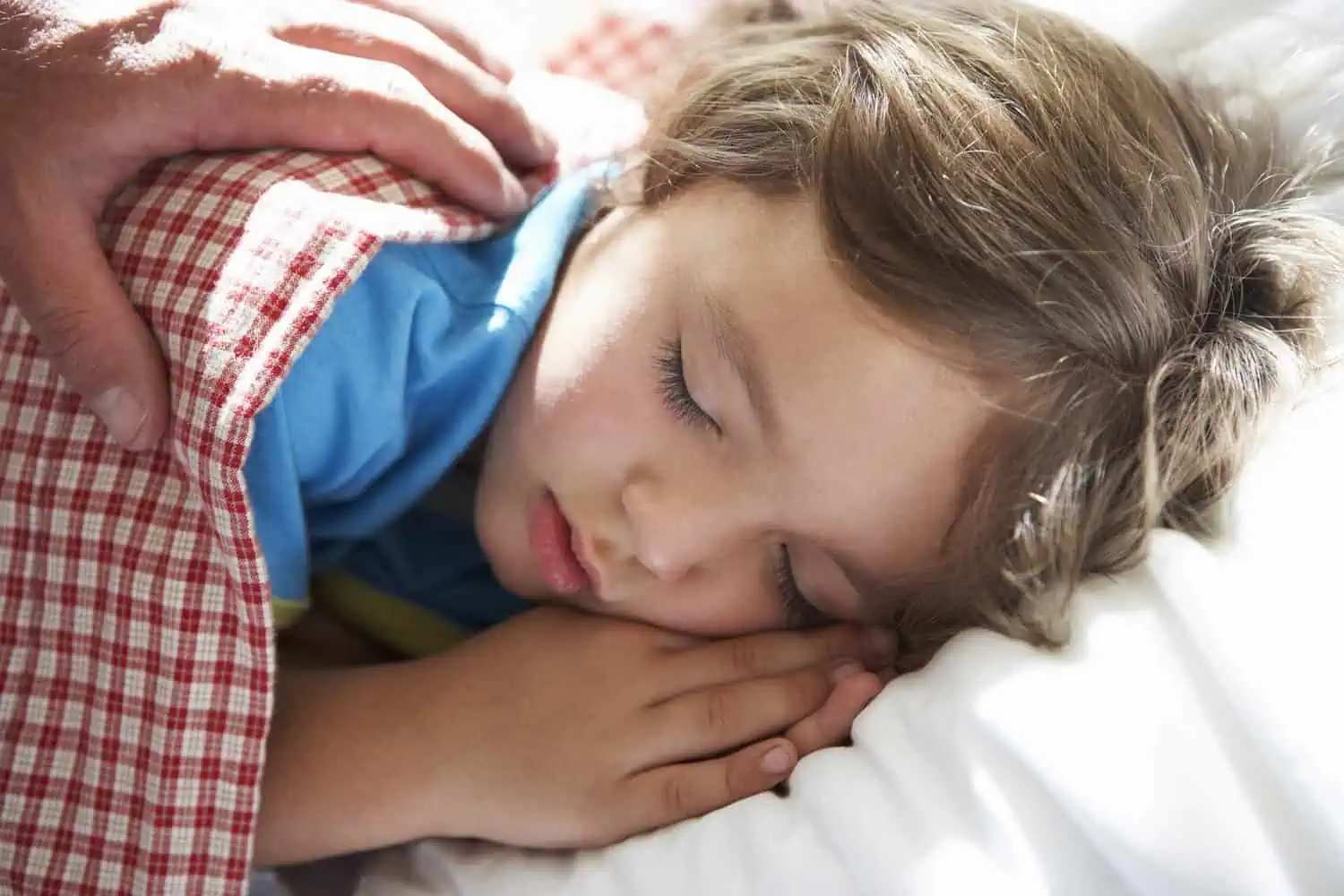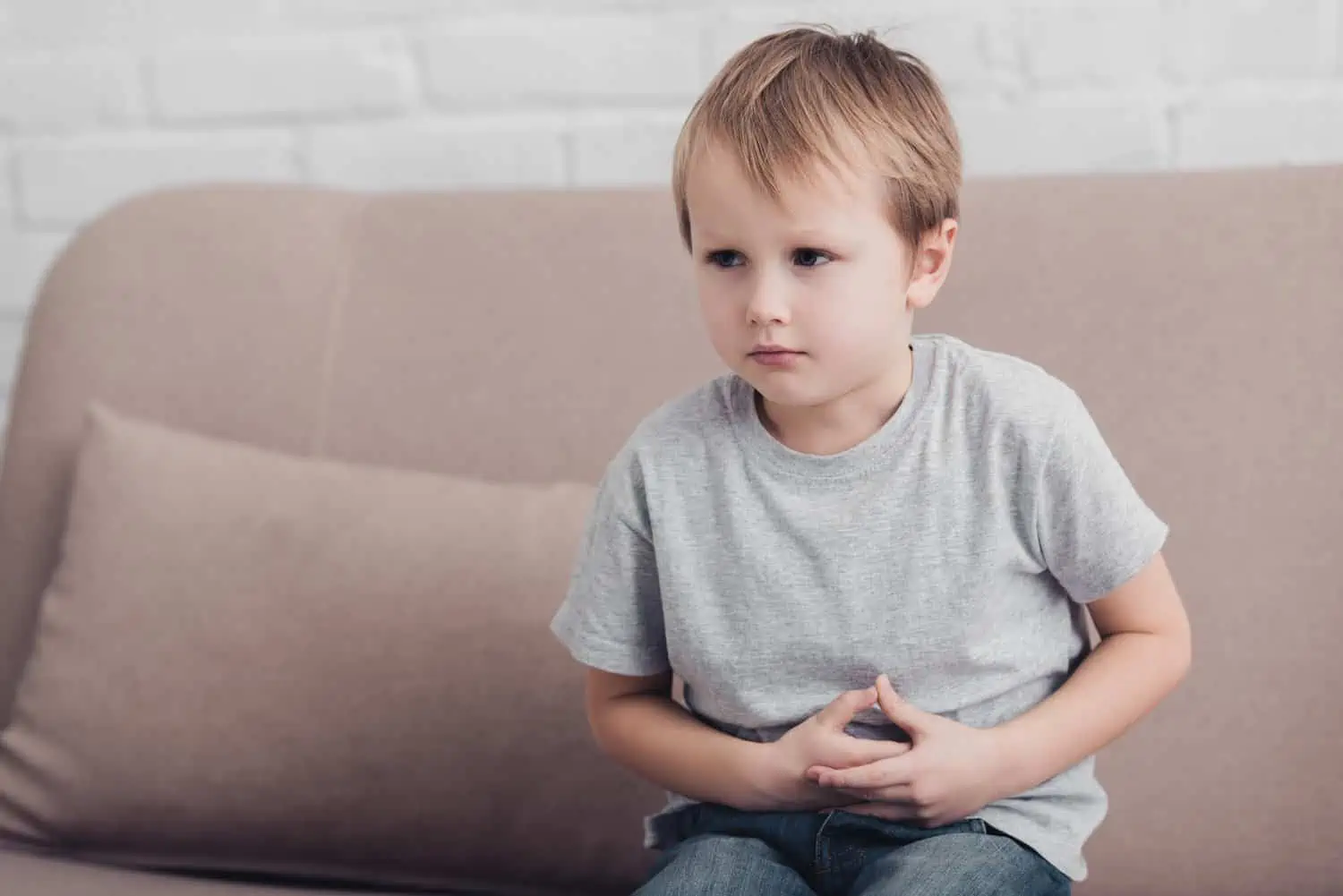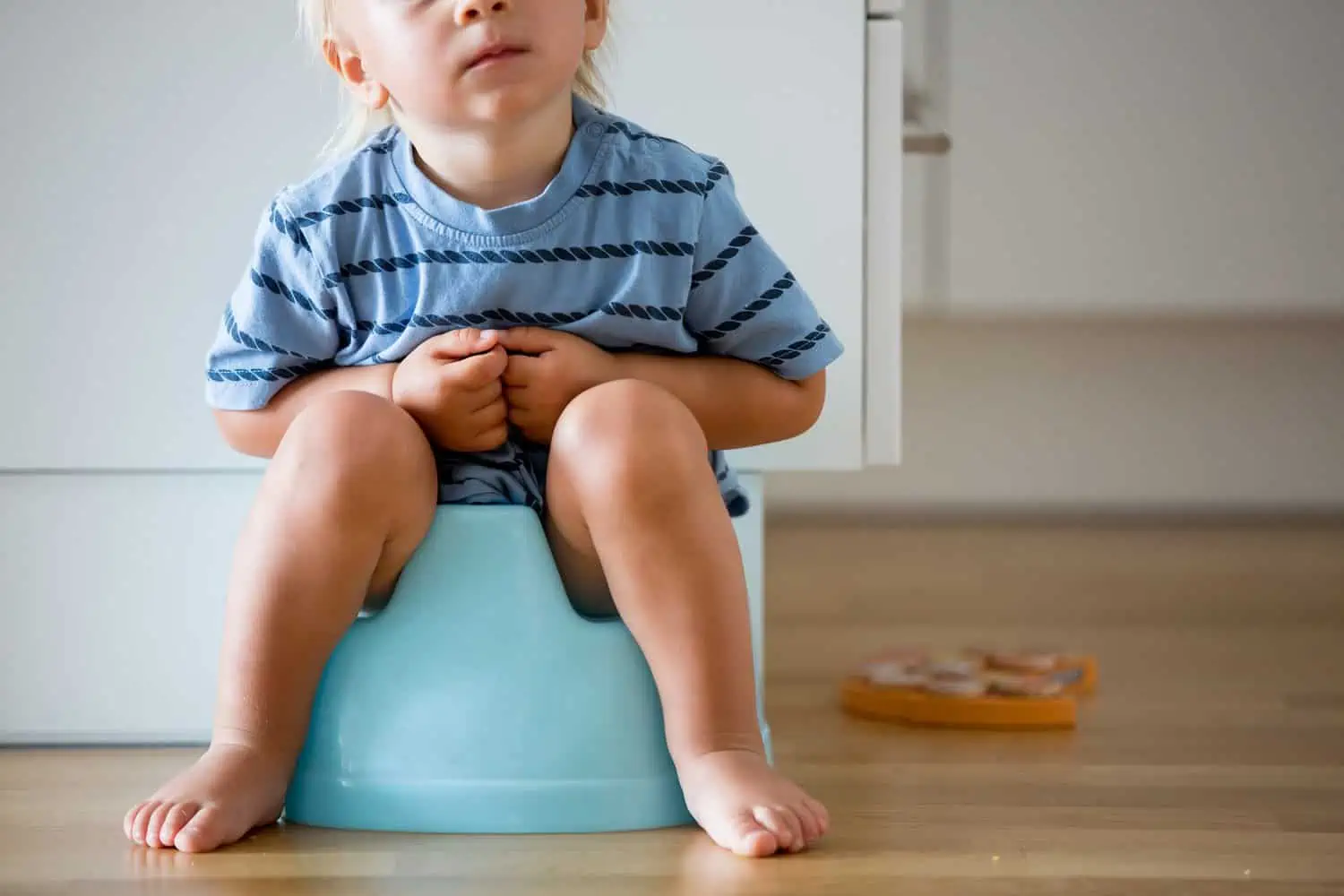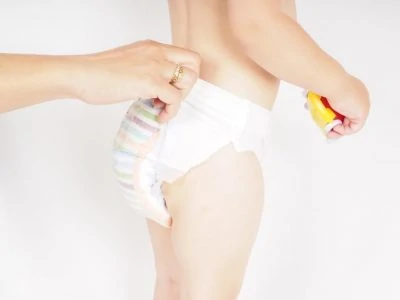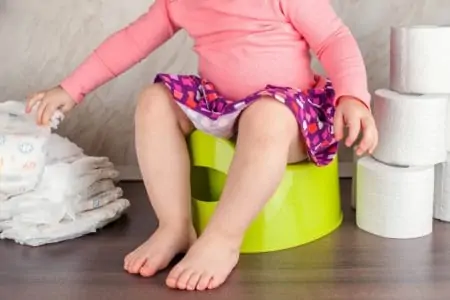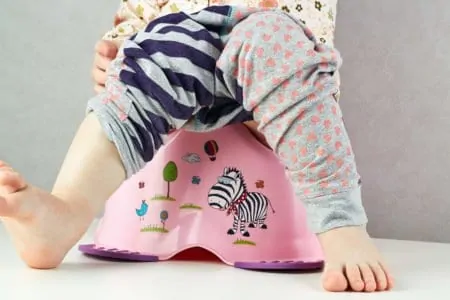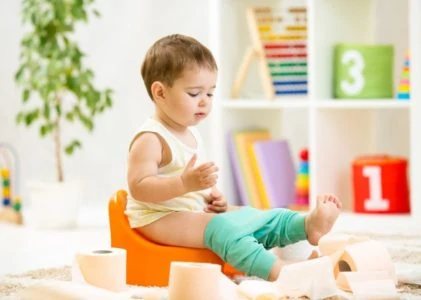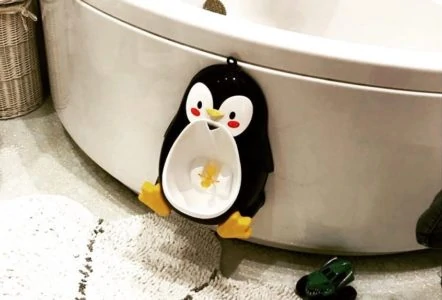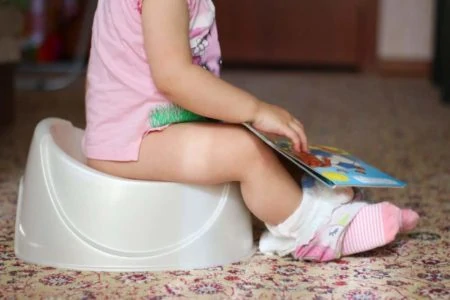Waking up to wet sheets is exhausting. Your child likely feels embarrassed or uncomfortable, and you are probably tired of the nightly wakeups and endless loads of laundry.
The good news is that this period won’t last forever, and we can help you get through it. We spent hours researching enuresis, what causes it, and the best solutions to help your family sleep soundly again.
With our advice on how to stop bedwetting, some patience, and guidance from your child’s doctor, bedwetting will soon become a thing of the past.
What Parents Should Know About Bedwetting
There are a few things you should know about bedwetting that might make you feel less alone.
First, bedwetting is incredibly common, even if your child is fully toilet-trained during the day. Around 15 percent of children wet the bed until age five (1). Between one and two percent of children wet the bed past the age of 14, and boys are twice as likely to experience this as girls.
To reduce accidents, it helps to limit drinks right before bedtime, especially caffeinated beverages or sugary juices. A great strategy is “double voiding.” Encourage your child to pee 15 minutes before bed, and then once more just before you tuck them in.
Another helpful way to handle bedwetting is to remain calm. If you punish your child for peeing on the bed, they can become anxious and embarrassed, which might actually make the problem worse.
Instead of punishment, encourage them to help with the cleanup so they feel part of the solution. On nights they don’t wet the bed, or when they successfully follow their bedtime bathroom routine, you can use a sticker chart to celebrate the win.
If you are still struggling, waking your child up briefly in the middle of the night to take them to the bathroom can prevent a soaked mattress.
In some cases, you might need external support. You should contact your pediatrician if bedwetting becomes a sudden issue after months of dry nights. We also recommend contacting a doctor if your child shows signs of a urinary tract infection, drinks excessive amounts of water, pees frequently during the day, or has swollen feet.
What Causes Bedwetting?
Here are five common reasons a child might wet the bed.
1. They Are Still Young
Up until the age of five, it is considered normal for a child to wet the bed. Experts typically recommend trying to remove nighttime diapers six months after your child is fully potty-trained during the day.
Their bladder might still be too small or underdeveloped to hold urine through the night, especially since kids at this age sleep 10 to 12 hours per night (2). If they are under five, consider keeping them in pull-ups overnight to reduce stress for everyone.
2. Urinary Tract Infection (UTI)
A UTI can lead to unexpected bedwetting. You might suspect a UTI if the accidents happen suddenly, especially after months or years of staying dry. An infection can make it difficult for your child to control when they urinate.
Other symptoms of a UTI include pain when urinating, needing to pee more often, stomach or back pain, foul-smelling pee, fever, and vomiting (3). If you see these signs, a doctor can prescribe antibiotics to clear it up.
3. Poor Sleep or Sleep Apnea
Poor sleep quality can lead to bedwetting. Disruptions like loud noises, electronic devices, or pets in the room can mess with their sleep cycles. Make sure your child’s sleep space is quiet, dark, and peaceful.
Sleep apnea, a condition where breathing pauses during sleep, is also a known cause. It is thought that the extra pressure on the bladder from struggling to breathe, combined with hormonal changes, triggers the need to urinate (4). Enlarged tonsils are a common culprit here.
4. Stress and Fear
Psychological stress can manifest physically. Whether your child has moved schools, become an older sibling, or experienced a change in routine, these stressful factors can lead to regression and bedwetting.
5. Medical Issues
Finally, specific medical issues can cause bedwetting. Beyond UTIs, sudden bedwetting can be caused by chronic constipation, diabetes, or a hormonal imbalance of the antidiuretic hormone (ADH). In rare cases, it signals a problem with the neurological or urinary system (5).
If you have ruled out sleep, stress, and age as factors, it is time to investigate whether there is an underlying medical issue.
Common Misconceptions About Bedwetting
There are plenty of myths floating around about why kids wet the bed. Here are 10 frequent misconceptions debunked.
1. Bedwetting Isn’t Normal
False. Bedwetting is very common up until the age of five. In some cases, it is considered developmentally normal up until the age of seven.
Genetics play a huge role here. A child is more likely to wet the bed if their parent did so as a child (6). If both parents were chronic bedwetters, the child is 80 to 90 percent more likely to have the same issue.
2. Bedwetting Is Caused by Deep Sleep
False. While it seems like your child sleeps like a log, deep sleep itself doesn’t “cause” the urine production (7). The issue is actually an arousal disorder.
Your child has trouble rousing when the bladder signals that it needs to be emptied. Typically, a child will get the message and wake up; a bedwetter might stir but remain in a relaxed state, releasing urine without fully waking.
3. Laziness Causes Bedwetting
This is a harmful myth. No child would rather lie in their own urine than get up for a quick bathroom break.
If your child is not waking up to go to the bathroom, it is usually because their brain isn’t receiving or processing the “bladder full” signals correctly during sleep. They could also have an ADH hormone imbalance (8). ADH slows down urine production overnight, and some kids just don’t produce enough of it yet.
4. Water Before Bed Causes Bedwetting
Limiting beverages right before bed can help manage the volume, but drinking water doesn’t cause the condition. It is perfectly normal for a child to hydrate before bed and not wet the sheets.
A healthy sleeper will simply wake up and use the bathroom when needed. Don’t dehydrate your child or deny them water if they are thirsty just to stop accidents; it usually doesn’t fix the root cause.
5. Toilet-Trained Children Should Stay Dry
Myth! Just because your child is daytime potty-trained doesn’t mean they can magically make it through the night. The physical ability to hold urine for 10 hours sleep is different than holding it for 2 hours while awake.
We recommend nighttime potty training roughly six months after your child is fully daytime trained, but be prepared for it to take longer.
6. My Child Wets the Bed on Purpose
Not true. A child would not wet the bed to annoy you or draw attention to themselves. It is an accident, meaning it is not within their control.
Bedwetting is caused by a disruption between the bladder-to-brain message, genetics, medical issues, or development. It is almost never a behavioral problem.
7. Punishment Will Stop Bedwetting
False. Punishing your child for wetting the bed is ineffective and damaging. It can embarrass them, lower their self-esteem, and cause emotional upset that leads to more accidents.
Your child cannot control these episodes, so it is crucial you don’t shame or discipline them for wet sheets.
8. Children Won’t Outgrow Bedwetting
This is a myth. Ninety-nine percent of children will outgrow bedwetting by the time they hit the teenage years. That might seem a long way off, but if you have ruled out medical causes, it is likely just a developmental delay that time will fix.
9. Bedwetting Signifies a Psychological Problem
While stress can trigger bedwetting, the act itself is rarely a sign of a deep psychological issue. It is more likely that bedwetting causes emotional problems, especially if the child is teased by siblings or punished by parents.
If your child has acute bedwetting accidents, support them through any stress they may be dealing with.
10. Kids Can Be Trained to “Hold It”
False. Toilet training isn’t about teaching a child to squeeze and hold. It is about encouraging your child to respond to their body’s signals immediately.
They should never be encouraged to hold their urine in for long periods, as this can lead to UTIs or dysfunctional voiding. Teach them to listen to their body and go when they need to go.
Best Solutions To Stop Bedwetting
If bedwetting is an ongoing occurrence, keep in mind that it is not always a sign of a major issue. If your child is ready and you have had the all-clear from their doctor, there are things you can do to help.
We put together a list of 10 gentle ways to manage and stop bedwetting.
1. Discuss It With Your Child
The first step is discussing bedwetting and nighttime expectations with your child. Explain that it is different from daytime training.
Talk about how they can learn to wake up and go to the bathroom when they feel the urge. If they do have an accident, acknowledge that it is okay. Reassure them that this is normal and won’t last forever.
2. Limit Fluids (Wisely)
Hydration is important, but you can time their intake to help keep sheets dry.
A good rule of thumb is to stop drinking large glasses of water one to two hours before bed. Try to limit caffeinated drinks or sodas at least six hours before bed, as these can irritate the bladder.
Top Tip
Bring your child to the bathroom 15 minutes before bedtime. Then ask them to go once more just before you tuck them in. This “double voiding” technique ensures the bladder is as empty as possible.
3. Urinary Bed Alarms
Urinary bed alarms have a high success rate, especially for older kids who are motivated to stop.
This device includes a moisture sensor worn on the underwear and an alarm attached to the shirt. When the sensor detects a drop of moisture, the alarm sounds to wake your child up. Over time, this trains the brain to associate the sensation of a full bladder with waking up.
Research has found that urinary bed alarms have a 73 percent success rate (9).
4. Wake Your Child Through the Night
You can set your own alarm to wake up, walk your child to the bathroom, and encourage them to urinate. This is often called “lifting.”
If you go to bed late, try doing this right before you turn in yourself. Letting your child pee in the middle of the night empties the bladder and buys you more time until morning.
5. Rule Out Constipation
Constipation is a sneaky culprit. Since the rectum is right behind the bladder, a bowel full of poop can push against the bladder, reducing its capacity and irritating it. About one-third of bedwetting episodes are caused by constipation (10).
Increasing fiber and water intake can help resolve this. Once the constipation clears, the bedwetting often stops.
Something To Note
Constipation can also be caused by stress or anxiety. If your child is going through a hard time, supporting them emotionally can help their physical symptoms, leading to relief for their tummy and their bladder.
6. Easy Bathroom Access
Ensure your child has a clear, lit path to the bathroom. If the toilet is on another floor or down a dark hallway, your child might be too scared or tired to make the trip.
Use nightlights in the hallway and bathroom. If the toilet is far away, consider placing a portable potty in their room for easy access.
7. Rewards for Routine (Not Dryness)
Positive reinforcement works, but be careful what you reward. Since they can’t control the bedwetting, rewarding “dry nights” might cause anxiety.
Instead, reward the behaviors that help. Give stickers for remembering to double-void before bed, for drinking water earlier in the day, or for helping change the sheets without complaining.
8. Rule Out Medical Issues
If you have tried everything, visit your pediatrician. Secondary enuresis (11) is when a child starts wetting the bed again after at least six months of dryness.
Around eight percent of kids develop this. It can be triggered by diabetes, UTIs, or emotional stress. Doctors can also prescribe medication like desmopressin to reduce urine production for special occasions like camp or sleepovers.
9. Encourage Good Toilet Habits During the Day
Healthy daytime habits lead to better nighttime control. Encourage your child to urinate every two to three hours to prevent “urgency” issues.
Some kids get so absorbed in play they hold it until the last second. Breaking this habit helps them recognize their body’s signals better, which translates to better awareness at night.
10. Waterproof Mattress Cover and Diapers
If your child is not ready, overnight pull-ups are a lifesaver. They minimize the drama and the laundry.
We know that a 6-year-old might feel embarrassed to wear them, but you can explain they are just “nighttime underwear” until their body grows a bit more. Always use a waterproof mattress protector.
Parent Hack
Layer your bedding! Put on a waterproof cover, then a fitted sheet, then another waterproof cover and another fitted sheet. If they wet the bed at 2 AM, simply peel off the top two layers and go back to sleep on the dry set underneath.
When Should You Be Concerned About Bedwetting?
While usually normal, a few instances indicate a more serious problem that warrants a doctor’s visit.
1. Your Child Is Over Seven
If your child is over the age of seven and still wetting the bed frequently, it is time to chat with a doctor. While 5 is a common age for parents to worry, 7 is generally the medical benchmark for when “growing out of it” should have happened.
2. You Suspect a UTI
Always call your doctor if you suspect a UTI. Symptoms include painful urination, stomach or back pain, fever, lethargy, or sudden daytime accidents. UTIs require antibiotics.
3. Your Child Is Worried
If your child is becoming withdrawn, anxious, or avoiding social events like sleepovers, seek support. The emotional toll can be harder on them than the physical aspect. Your primary care physician can offer solutions to help boost their confidence.
Bedwetting Treatment
There are treatment options available if your child is diagnosed with nocturnal enuresis. Treatment usually involves a mix of behavioral changes and, in some cases, medication:
- Changing habits: Double voiding before bed, limiting caffeine, and using moisture alarms are the first line of defense.
- Treating medical conditions: resolving constipation or infections often stops the bedwetting immediately.
- Desmopressin: A medication that mimics the hormone vasopressin, causing the kidneys to produce less urine overnight (12).
- Anticholinergics: Medications like Oxybutynin help relax the bladder muscles and are useful if the child also has daytime wetting issues.
- Imipramine: An older medication that changes sleep patterns and bladder capacity, though it is used less frequently now due to side effects.
- Motivational therapy: Using positive reinforcement systems (sticker charts) for following routines, rather than shaming for accidents.
FAQs About Bedwetting
In Conclusion
Bedwetting is a common part of childhood, especially up to age five or seven. It is rarely a sign of bad behavior or laziness.
If your child was previously dry at night and suddenly starts having accidents, look for triggers like stress, constipation, or a UTI. Most of the time, the solution involves patience, a good waterproof mattress protector, and time.
Remember, your child will outgrow this. Until then, use pull-ups if you need to, keep the tone positive, and consult your pediatrician if you have concerns.



